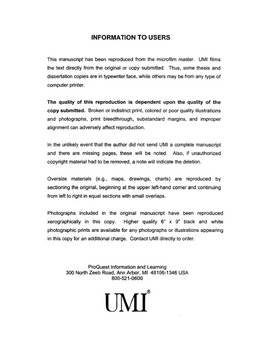| dc.contributor.advisor | Harris, Betty J., | en_US |
| dc.contributor.author | Hysmith-jones, Annie Laurie. | en_US |
| dc.date.accessioned | 2013-08-16T12:18:15Z | |
| dc.date.available | 2013-08-16T12:18:15Z | |
| dc.date.issued | 2001 | en_US |
| dc.identifier.uri | https://hdl.handle.net/11244/315 | |
| dc.description.abstract | This study examines the breakdown in Xhosa-speaking cultural, economic, and political structures that have been transformed in response to colonialism and apartheid. Its primary purpose was to identify indicators that influence the conditions endured by rural female-headed houses in the Eastern Cape, South Africa. | en_US |
| dc.description.abstract | The results revealed the degree of transformation of social, economic, and political structures documented in the archival record and by informants. The overall findings indicate the following: the acceleration of poverty in female headed households in rural communities; the socio-economic cleavages that exist between rural and urban households; the incorporation of Western beliefs and customs with traditional rituals; the high level of stress-related conditions amongst women (and men); and the diversity of adaptive coping strategies employed by women. | en_US |
| dc.description.abstract | The implications for this study indicated a need to improve the quality of life for members of households in Eastern Cape rural communities; for the creation of jobs and human resources in close proximity to rural households; for the development of government and non-government structures and programs to support economic parity for women and gender equality in all relevant areas of the lives of rural households. | en_US |
| dc.description.abstract | Two research survey instruments were used for data collection. One survey was designed for interviewing women in rural and urban communities. The second instrument was designed to solicit data from men. Other collateral interviews were conducted with professional, civic, and service professionals. | en_US |
| dc.description.abstract | The Seylean stress bio-cultural model was adapted for the study. This study used a holistic, multidisciplinary and ethnographic approach that included conventional anthropological qualitative and quantitative data collection methods. The comprehensive research design incorporated the disciplines of anthropology, sociology, gender theory, psychology, and history. | en_US |
| dc.format.extent | x, 254 leaves : | en_US |
| dc.subject | Rural families South Africa Eastern Cape Social conditions. | en_US |
| dc.subject | Rural families South Africa Eastern Cape Economic conditions. | en_US |
| dc.subject | Households South Africa Eastern Cape. | en_US |
| dc.subject | Women's Studies. | en_US |
| dc.subject | Xhosa (African people) South Africa Eastern Cape Economic conditions. | en_US |
| dc.subject | Women heads of households South Africa Eastern Cape Economic conditions. | en_US |
| dc.subject | Xhosa (African people) South Africa Eastern Cape Social conditions. | en_US |
| dc.subject | Anthropology, Cultural. | en_US |
| dc.subject | Women heads of households South Africa Eastern Cape Social conditions. | en_US |
| dc.subject | Psychology, Clinical. | en_US |
| dc.title | Migrancy and changing structures: The experiences of South African women in the Eastern Cape. | en_US |
| dc.type | Thesis | en_US |
| dc.thesis.degree | Ph.D. | en_US |
| dc.thesis.degreeDiscipline | Department of Anthropology | en_US |
| dc.note | Chair: Betty J. Harris. | en_US |
| dc.note | Source: Dissertation Abstracts International, Volume: 62-03, Section: A, page: 1104. | en_US |
| ou.identifier | (UMI)AAI3009538 | en_US |
| ou.group | College of Arts and Sciences::Department of Anthropology | |
